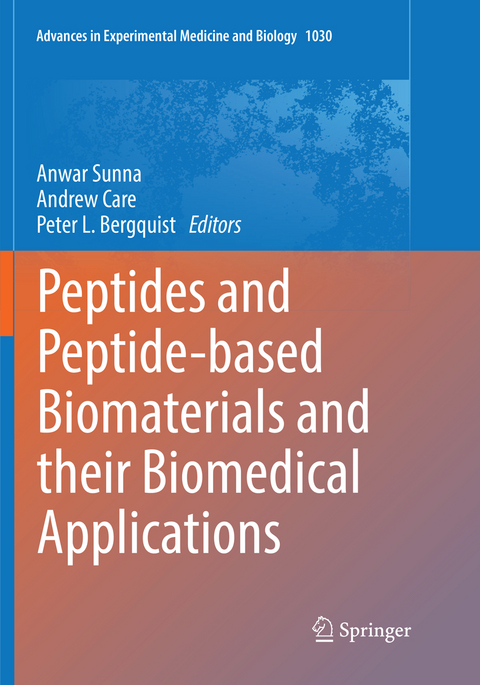
Peptides and Peptide-based Biomaterials and their Biomedical Applications
Springer International Publishing (Verlag)
978-3-319-88174-4 (ISBN)
Anwar Sunna is an Associate Professor in the Department of Chemistry and Biomolecular Sciences at Macquarie University (MQ), Sydney, Australia. He obtained a PhD from the Hamburg University of Technology in Germany. He was manager of the Environmental Biotechnology Co-operative Research Centre at MQ and later was the recipient of the prestigious Vice-Chancellor's Innovation Fellowship. His recent research has been on the interaction between biomolecules and inorganic compounds including new synthetic peptide linkers with applications in the functionalisation of nanoparticles, bioimaging and cancer therapy. Anwar is a member of the MQ Biomolecular Discovery and Design Research Centre, MQ Biosecurity Futures Research Centre, Australian Research Council (ARC) Training Centre for Molecular Technology in the Food Industry and the ARC Centre of Excellence for Nanoscale BioPhotonics. He is also one of the directors of Synthetic Biology Australasia. Andrew Care is a Research Fellow in the ARC Centre of Excellence for Nanoscale BioPhotonics, a transdisciplinary research centre that aims to develop innovative nanotechnologies to investigate complex living systems. He obtained his PhD from Macquarie University (MQ) in Sydney, Australia. Andrew is also a member of both the MQ Biomolecular Discovery and Design Research Centre and the MQ BioFocus Research Centre. His current research is focused on the development of engineered biomolecules, including solid-binding peptides, to control the self-assembly and biofunctionalisation of materials and biomolecules in a range of biomedical and biotechnological applications. Peter Bergquist is Emeritus Professor in the Biomolecular Discovery and Design Research Centre at Macquarie University and Emeritus Professor in the Department of Molecular Medicine & Pathology at The University of Auckland Medical School. He has a PhD and DSc from the University of Auckland in New Zealand and has been a Postdoctoral Fellow and Research Fellow at Harvard Medical School, Yale and Oxford Universities and a Visiting Fellow at New York University School of Medicine. His recent publications reflect research performed with the Environmental Biotechnology Co-operative Research Centre in Australia and he developed research expertise in gas phase catalysis and biofunctionalisation of inorganic matrices containing silica. He has been on the editorial boards of several significant journals such as Applied and Environmental Microbiology and Journal of Bacteriology.
Programmable Bio-Surfaces for Biomedical Applications.- Solid-binding Peptides in Biomedicine.- Molecular Modelling of Peptide-based Materials for Biomedical Applications.- Design principles of peptide based self-assembled nanomaterials.- Bioprinting and Biofabrication with Peptide and Protein Biomaterials.- Peptides as Bio-Inspired Molecular Electronic Materials.- Peptide-Based Materials for Cartilage Tissue Regeneration.- Peptides and Drug Delivery.- Peptide Lipidation - A Synthetic Strategy to Afford Peptide Based Therapeutics.- Molecular Engineering of Conus Peptides as Therapeutic Leads.- Uptake Mechanism of Cell-Penetrating Peptides.- Empowering the Potential of Cell-Penetrating Peptides for Targeted Intracellular Delivery via Molecular Self-Assembly.- The Current Role of Cell-Penetrating Peptides in Cancer Therapy.
| Erscheint lt. Verlag | 29.8.2018 |
|---|---|
| Reihe/Serie | Advances in Experimental Medicine and Biology |
| Zusatzinfo | XIII, 300 p. 111 illus., 74 illus. in color. |
| Verlagsort | Cham |
| Sprache | englisch |
| Maße | 178 x 254 mm |
| Gewicht | 819 g |
| Themenwelt | Medizin / Pharmazie ► Medizinische Fachgebiete ► Biomedizin |
| Medizin / Pharmazie ► Studium | |
| Naturwissenschaften ► Biologie ► Biochemie | |
| Technik ► Maschinenbau | |
| Schlagworte | biomaterials • biomedicine • biopolymers • nanomaterials • Peptides • Protein-Ligand Interactions |
| ISBN-10 | 3-319-88174-4 / 3319881744 |
| ISBN-13 | 978-3-319-88174-4 / 9783319881744 |
| Zustand | Neuware |
| Haben Sie eine Frage zum Produkt? |
aus dem Bereich


